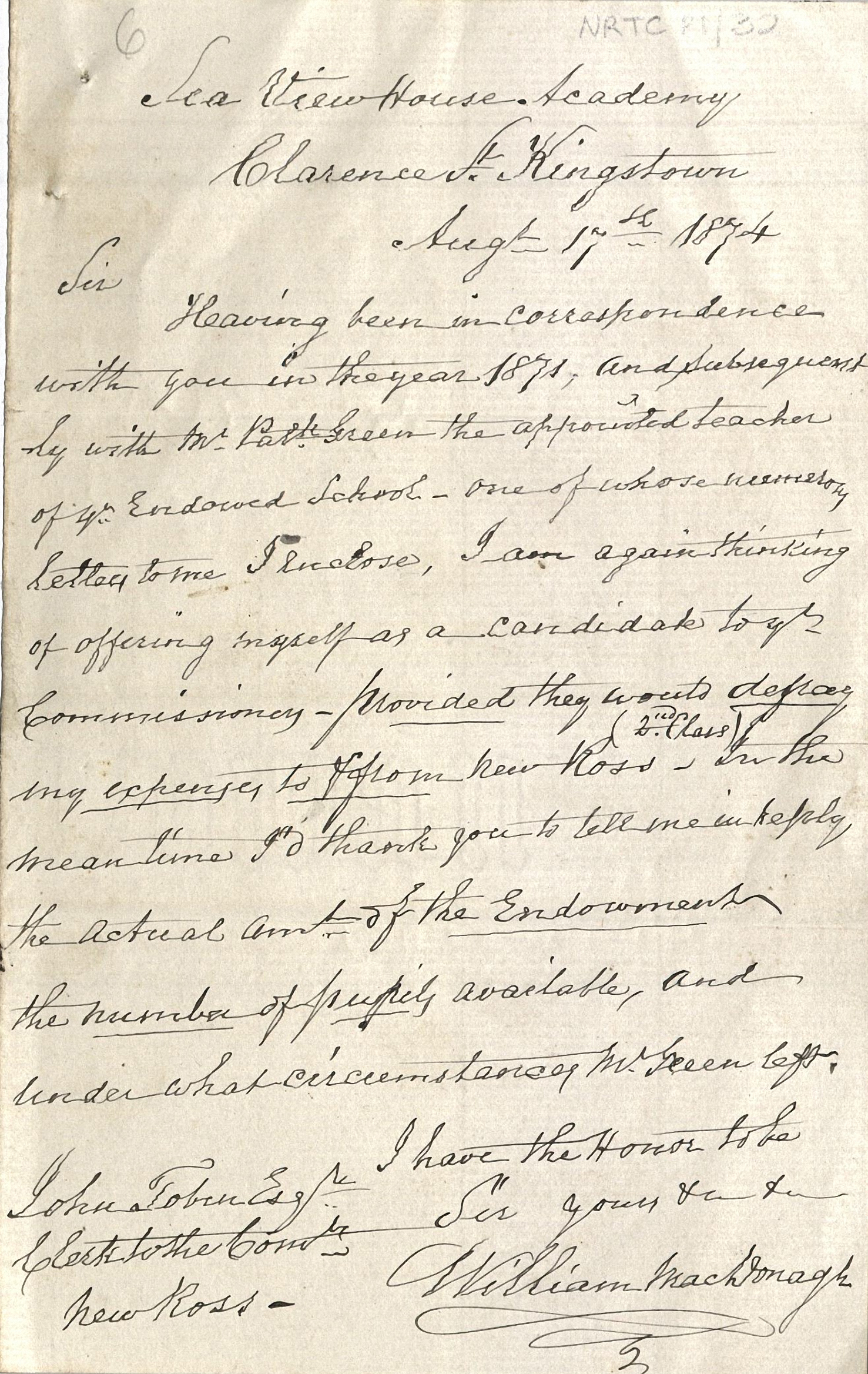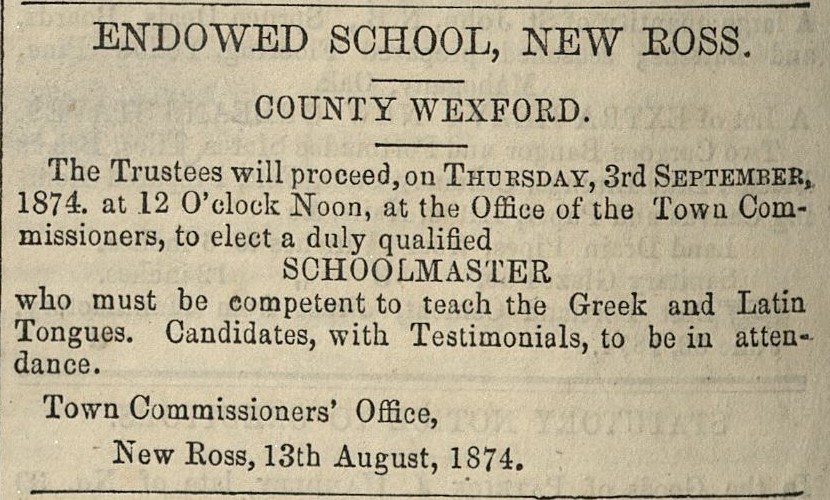By Grainne Doran
New Ross municipal archive contains an interesting cache of handwritten applications from nineteen prospective candidates for the post of schoolmaster in the John Ivory Endowed School in the town during the 1860s–70s.

Located on the north-eastern side of North Street (now John Street), the school was endowed in 1713 by John Ivory, then sovereign of New Ross Corporation, whose grandfather, Captain William Ivory, had obtained possession of the grounds of St John’s Abbey in 1667. The property included a mansion house, ‘commonly called the Abbey’, with all outhouses and other hereditaments, of which Ivory was seized in fee.
Under the deed of endowment (19 February 1713), control of the school was vested in New Ross Corporation through Ivory (then sovereign), John Cliffe (then recorder), William Napper and Henry Napper (then capital burgesses), and in Revd Robert Elliott (then vicar of St Mary’s Church, New Ross) and their successors as trustees, to hold all rents and issues from the premises—other than the schoolhouse—for the maintenance and continuation of a free school, and for the schoolmaster. The master was annually obliged ‘without fee or Reward’ to teach four poor scholars of the Protestant religion as recommended to him by the trustees, and had to be competent in teaching ‘the Greek and Latin Tongues’.
The first master appointed to the free school was Revd Harfinch Piggot in 1713. A further fourteen appointments followed up to the late 1860s. The number of high-calibre candidates for a relatively small school, which generated a small income with few pupils, is interesting. One applicant, Samuel Worden from South Richmond Street, Dublin, was described as ‘a very accomplished linguist’ in a testimonial from W.H. Newell, inspector of schools (October 1868). Similarly, J.C. Brogan’s application (Cork) in August 1869 advised that as headmaster of Nenagh seminary he ‘passed more boys successfully for special examinations than most teachers in Ireland’.
Following Master Henry Martin’s resignation in early 1868, a dispute arose regarding the rights of the Town Commissioners, as successors to New Ross Corporation, to appoint a ‘highly qualified and experienced Master’ under the 1713 deed. This was further challenged when Michael Kelly, a Roman Catholic, was appointed on 11 September 1868. A letter (21 September 1868) from Kelly to a Mrs Neville requesting her to hand over the school key and ‘peaceable possession’ was countered by her reply that Kelly’s appointment was ‘altogether irregular’. Kelly died suddenly on 28 March 1869, leaving the post vacant.
Apart from four poor Protestant scholars, there was no stipulation in Ivory’s deed that the master or remaining pupils were to be exclusively Protestant. In the six years up to 1874, four Catholic schoolmasters were appointed to the school. Several applicants enquired about the salary, benefits and residence attached to the post. In May 1869, Revd James Patterson (Lismore College, Co. Waterford) advised that he would not consider applying ‘should the expected nett income of the school fall much under £150 per annum’. The tenure of Edmund Lawless Hogan, Kingsland Park, Dublin, appointed master in June 1869, was short-lived; he informed the Commissioners of his resignation in October 1871 following his unsuccessful endeavours ‘to obtain a satisfactory settlement of the legal questions in dispute’ and the ‘disgraceful state of dilapidation and neglect’ of the schoolhouse, which was ‘utterly deficient … for carrying on the business of a high-class school’.

Patrick Green was appointed master on 23 October 1871, having taught Classics, French and Science for 26 years, with testimonials from several aristocratic families in Tipperary and Waterford. He resigned on 1 May 1874, observing that the number of pupils was not sufficient to support him. Efforts at quarrying stones on the premises to expend ‘every penny received’ therefrom on house repairs were thwarted following an order from the clerk to discontinue such activity.
The appointment of John J. Dee, Castlecomer, Co. Kilkenny, was sanctioned on 3 September 1874 ‘on condition that he sign a document exonerating the Town Commissioners, individually and collectively, from any claim for compensation’. Revd Francis Le Hunte, trustee, advised the Commissioners of a proceeding in chancery for arranging the school’s affairs. Dee’s description of the schoolhouse being ‘in such a dilapidated state that it will require more to put it in even sufficiently decent order for the reception of young gentlemen’ saw him resigning on 10 November 1875.
The clarification of powers and duties vested in the Town Commissioners is a constant thread through the collection. Rent from tenants on the premises had not been paid to them since the last Protestant schoolmaster left in 1868 and they were unable to expend any of the municipal incomes on school repairs.
A scheme for the future direction and management of the charity was recommended. In a report from the Commissioners Appointed to Enquire into Endowed Schools in Ireland, it was noted that in 1835 the course of education in the school ranged from Greek, Latin, French, Euclid (geometry, mathematics), algebra, General English and mercantile instruction to drawing, scriptures and religion. The average attendance then of day-pupils was twelve, ‘five entered as free, leaving only 7 paying £2 each per annum, and 2/- extra for French’. All pupils at that time were members of the United Church. Prior to 1867, the number of pupils had been diminishing, with the master’s principal support being derived from the sale of earth, quarry, stones and rubbish, ‘and the burial ground of the old Abbey for building purposes and for ballasting vessels’.
Detailed research is warranted into the John Ivory Endowed School, New Ross, especially its formative years (it closed in 1943). As a complement to the collection, the digitised New Ross Corporation minutes (1658–1841) are freely available on Wexford County Archive’s website, with the first two books (1658–1741) transcribed and fully searchable (www.wexfordcountyarchive.com). Minute-books for the New Ross Town Commissioners for the period 1843–80 are in the process of being digitised and will shortly be available online.
Grainne Doran is Archivist with Wexford County Archive.

